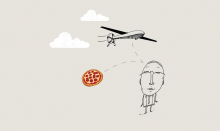adaptation
BETWEEN 6:30 AND 7 nearly every morning, a dark rumble drifts up through the chilled air from the railroad tracks at the bottom of our hayfield in the Adirondack foothills of New York. A line of more than 100 black tanker cars, mostly full of fracked Bakken oil from North Dakota, rolls southward. They will pass the field where our neighbor’s kids play, then close alongside beautiful Lake Champlain, which defines this region, and on to Albany, where the oil will be put on barges and floated down the Hudson River to New Jersey, to be stored or refined.
Tanker cars like these have been blowing up recently. An accident north of us, over the Canadian border, flattened a downtown and killed 47 people. These cars carry a mix of crude oil and volatile compounds arising from the fracking process, making them dangerously flammable. I worry about my small town’s volunteer fire fighters, all of whom I know personally and admire greatly, who do not have the expertise or the equipment to deal with an accident like that.
Watching the tanker cars, I am also haunted by a scene seared into my memory five months ago. We are driving east along U.S. Route 2 in North Dakota, our small camper in tow, trying to pass through Williston, smack in the middle of the Bakken oil fields.
As the sun sets, we see hundreds of oil and gas rigs flaring excess volatile gases in huge plumes of orange flame. Processing plants spew fumes of God-knows-what. There are row upon row of metal trailers, boxes really, actually used as housing for people. Unrelenting traffic beats a path on the undivided highway under furious construction, with no breakdown lanes or turn-offs for miles. Huge water tankers and oil trucks force us to move onward at 60 mph; there will be no rest for us here, as all campgrounds, gas stations, and parking lots are filled with the rigs of the temporary workers.

THIS YEAR IS shaping up to be one of enormous transition, although nothing specific comes to mind right now. I’ve just got this gut feeling. But the word that will best guide us through the coming changes may be “adaptation,” which my copy of the Merriam-Webster Dictionary defines as “the process of changing to fit some purpose or situation.” My copy of the dictionary also wants me to know how grateful it is to be picked up from behind the bookshelf where it had fallen years ago. It wedged against a hot-water pipe and got kind of u-shaped.
It actually felt good to look up something in hard copy, even if the pages were warm and wrinkled. But using Google is much faster, even subtracting the time it takes to first sing the alphabet song to remind me what order the letters are in. The point is, dramatic changes will be happening to our world, and we either adapt to them or die.
Okay, maybe not die. But when Brand New becomes No Turning Back, there’s no point in resisting. This year, for better or worse, “I don’t wanna” will become “but I hadda.”
My family has already started making the necessary changes. We have no fireplace in our home, since our house was built before the discovery of fire, and thus we have no chimney for Santa to come down. But last Christmas we adapted. We hung the stockings from the microwave, then left the door open and hoped for the best.
The most precious place on Earth for me is a camp on a lake in the Adirondack Mountains of New York. During the next century, climate change will chase northward things that I cherish. Spruce, tamaracks, sugar maples, balsam fir, moose, mink, and loons will no longer grace the shores and waters of that lake. Like most people in northern climes, I see the changes happening already. I have to fight hard against despair, for my personal losses, yes, but also for the universality and injustice of the calamity, which already affects so many of the poor and innocent.
WHY IS IT so hard for people to respond effectively to the reality of climate change?
Changing people’s minds—with facts, tables, and predictions—has proven extremely difficult. Even showing people the miraculous beauty of the planet alongside the predicted losses is not working. Guilt, anxiety, and anger can be motivating forces, but they have debilitating side effects: They are all soul-destroying.
So I wonder about our hearts. Have we ignored our emotional and spiritual connections to the planet? Could the noise swirling around climate change—science, politics, media blitzes, as well as the weather disasters themselves—drown out the voice of a loss so profound that it rests unnamed in our souls? Could our breaking hearts be part of the reason we are immobilized?
In the 1960s, Rachel Carson’s image of a “silent spring” due to the proliferation of pesticides was as heartrending as it was controversial. Carson was ridiculed, her predictions dismissed. The corporate world paid millions to have her silenced. But eventually the love of bird songs won out. People read Carson’s book, grieved at the prospect of a silent spring, spoke up, and insisted the chemical-company-supported politicians ban DDT.
While many people continue to believe there is no climate crisis, those most affected by global warming—particularly in the global South—know otherwise. According to Sojourners magazine’s interview with Malawi activist Victor Mughogho, the “impacts are quite severe on the ground.”